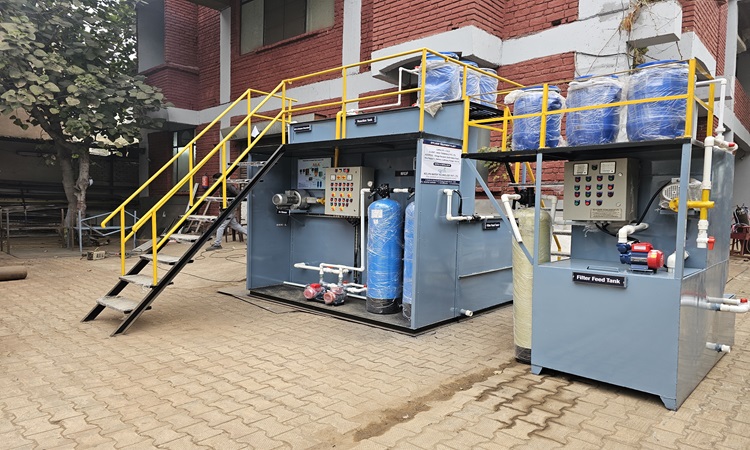Why Industries Need Combined Effluent Treatment Plants for Compliance?

Industrial growth is a key driver of economic development, but it comes with a responsibility: managing wastewater effectively. Across industries, the discharge of untreated or partially treated effluents has been a major cause of environmental degradation, threatening water bodies, soil quality, and public health. To address this issue, Combined Effluent Treatment Plants have emerged as an effective solution, especially for clusters of industries.
CETPs provide a centralized system to treat effluents from multiple small and medium enterprises (SMEs), ensuring that all wastewater is treated before discharge. By doing so, they not only safeguard the environment but also help industries comply with stringent pollution control regulations. Companies like Kelvin Water Technologies Pvt. Ltd., a leader in wastewater treatment solutions, play a vital role in designing and supplying state-of-the-art CETPs that ensure regulatory compliance and sustainable operations.
Combined Effluent Treatment Plants
A Combined Effluent Treatment Plant is a large-scale treatment facility that collects, treats, and disposes of wastewater from multiple industries in an industrial area or estate. Unlike individual effluent treatment plants (ETPs), CETPs offer a cost-effective and collaborative approach, particularly beneficial for small-scale industries that may lack the resources to establish their own ETPs.
The wastewater reaching CETPs often contains a mix of chemical pollutants, heavy metals, dyes, oils, and other contaminants. Through processes like primary treatment, biological treatment, chemical neutralization, and tertiary filtration, CETPs ensure the effluent meets prescribed discharge standards set by the Central Pollution Control Board (CPCB) and State Pollution Control Boards.
Why Industries Need CETPs for Compliance
1. Stringent Environmental Regulations
Environmental agencies such as CPCB and SPCBs enforce strict discharge norms for wastewater. Non-compliance can result in heavy penalties, shutdown notices, or even cancellation of licenses. A CETP ensures industries meet these standards consistently, reducing the risk of non-compliance.
2. Cost-Effectiveness for SMEs
Setting up and operating individual ETPs can be financially challenging for small industries. CETPs provide a shared infrastructure where costs are divided among multiple units. This makes advanced wastewater treatment accessible to SMEs without burdening their operational budgets.
3. Efficient Resource Utilization
CETPs are designed with modern technologies that allow water recovery and reuse. Treated water can be recycled back into industrial operations for cooling, washing, or process applications. This reduces freshwater dependency and supports industries in achieving sustainability goals.
4. Standardized Treatment Quality
While individual ETPs may vary in performance, CETPs follow a uniform and standardized process. This ensures a consistent level of treatment efficiency, minimizing variations in treated effluent quality.
5. Support for Industrial Clusters
Many industries, especially in textile, chemical, pharmaceutical, and leather sectors, operate in clusters. CETPs provide a centralized solution that serves these clusters effectively, ensuring collective compliance and reducing the environmental footprint of entire industrial estates.
6. Reduction in Pollution Load
Untreated effluents often contain hazardous pollutants that are harmful to aquatic life and human health. CETPs significantly reduce the pollutant load before discharge, contributing to cleaner rivers, lakes, and groundwater.
7. Corporate Social Responsibility
Industries today are judged not only on financial performance but also on their environmental stewardship. Adopting CETPs highlights a company’s commitment to sustainability and enhances its reputation with customers, stakeholders, and regulatory authorities.
Key Processes in a Combined Effluent Treatment Plant
1. Preliminary Treatment – Removal of large solids, oils, and grit through screening and sedimentation.
2. Primary Treatment – Neutralization and coagulation to settle suspended solids and adjust pH levels.
3. Secondary Treatment – Biological processes such as activated sludge or bio-reactors to degrade organic pollutants.
4. Tertiary Treatment – Advanced filtration, activated carbon adsorption, or membrane-based systems to remove residual contaminants.
5. Sludge Management – Proper treatment and disposal of sludge to prevent secondary pollution.
Benefits of CETPs for Industries
- Regulatory Compliance – Ensures industries meet CPCB/SPCB guidelines.
- Cost Sharing – Lowers individual investment by pooling resources.
- Sustainability – Promotes water recycling and reduces freshwater usage.
- Operational Ease – Centralized management reduces technical burdens on individual industries.
- Scalability – CETPs can be upgraded with advanced treatment modules as pollution loads increase.
Role of Kelvin Water Technologies in CETP Solutions
Kelvin Water Technologies Pvt. Ltd. is a trusted name in the field of wastewater treatment, offering customized and reliable solutions for industries across India. With years of expertise, the company has successfully designed, manufactured, and installed CETPs that meet international quality standards and comply with national regulations.
Why Choose Kelvin Water Technologies for CETPs?
1. Customized Design – Each CETP is tailored to the specific needs of the industrial cluster, considering the type and volume of wastewater.
2.Advanced Technology – Incorporates innovative treatment methods such as MBR (Membrane Bioreactor), MBBR (Moving Bed Biofilm Reactor), and RO (Reverse Osmosis) for higher efficiency.
3. Sustainability Focus – Emphasis on water recycling and energy-efficient operations.
4. End-to-End Solutions – From feasibility studies and design to installation, operation, and maintenance.
5. Regulatory Expertise – Ensures that all systems comply with CPCB/SPCB norms, helping industries avoid penalties.
Conclusion
Industries cannot ignore the importance of compliance when it comes to wastewater management. Combined Effluent Treatment Plants (CETPs) provide a sustainable, cost-effective, and compliant solution for treating industrial effluents, especially for small and medium enterprises. They help industries adhere to environmental regulations, reduce pollution, and promote water reuse.
Companies like Kelvin Water Technologies Pvt. Ltd. are at the forefront of this transformation, offering advanced CETP solutions that combine innovation, sustainability, and regulatory compliance. By adopting CETPs, industries not only protect the environment but also secure a cleaner, more sustainable future.